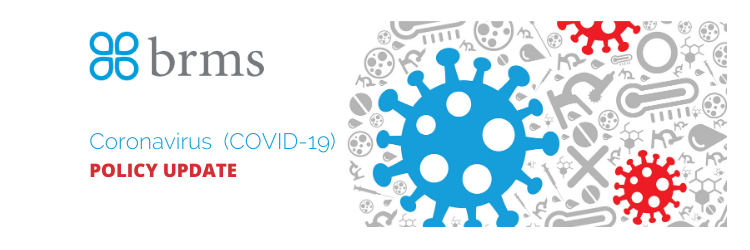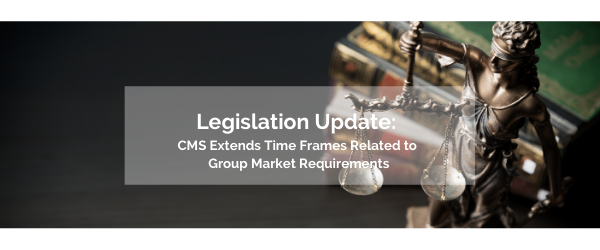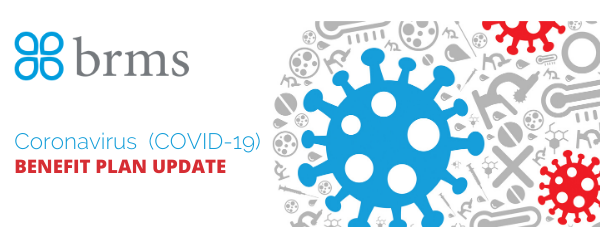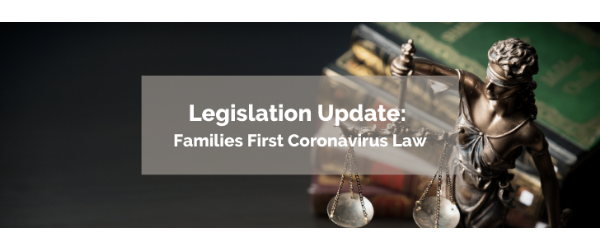

This Policy Update covers several recent federal and state issues related to COVID-19 coverage:
- CMS issues testing coverage guidelines
- Stimulus funding prohibits provider balance billing for COVID-19 treatment
- Overview of state COVID-19 bulletins-Premium grace periods
CMS Clarifies COVID-19 Testing Requirements for Group Health Plans
This past weekend, the Centers for Medicare & Medicaid Services (CMS), along with the Departments of Labor and Treasury, issued guidance related to COVD-19 coverage and group health plans. The recently approved stimulus packages passed by Congress, including the Coronavirus Aid, Relief, and Economic Security (CARES) Act, require that group health plans, including self-insured plans, cover COVID-19 testing and related items and services with no out-of-pocket expenses.
Testing Coverage
The guidance clarifies that antibody tests will be included in the definition of “testing” for coverage purposes. The guidance also outlines that a covered testing visit may include urgent care and emergency room visits, as well as an in-person or telehealth consult to the doctor’s office that involve the administration of a COVID-19 test. Any costs associated with testing any of these care settings must be covered with no cost-sharing. In addition, the guidance explains that plans must cover other items and services furnished to an individual during the visits such as an influenza or blood test, provided such additional tests are medically appropriate as determined by a physician.
COVID-19 Treatment
Interestingly, while CMS confirms that self-insured plans are not mandated to waive cost-sharing for COVID-19 treatment and other related telehealth services at this time, self-insured plans can voluntarily provide free coverage for COVID-19 treatment and/or telehealth services prior to statutorily notifying participants of material changes to the plan’s coverage. Many insurers are already voluntarily covering COVID-19 treatment and related telehealth services with no cost-sharing, and CMS confirms they may do so in spite of generally being prohibited from changing plan coverage mid-year. Please note that many, expect a future Phase 4 stimulus package to mandate that insurers, including self-insured plans, provide free coverage for COVID-19 treatment.
The guidance also provides that States have the ability to impose additional requirements on insurers, so long as those requirements do not conflict with Federal requirements. For example, States could extend certain grace periods or prohibit the cancellation of a policy for non-payment of premiums. Some self-insured plans are voluntarily providing similar flexibility.
Stimulus Funds & Balance Billing Prohibition
Following–up on a White House announcement late last week, the Department of Health & Human Services (HHS) issued formal guidance stating that hospitals accepting federal stimulus funding will be prohibited from balance billing COVID-19 patients, under both group and individual health plans, an amount greater than payment due an in-network provider. The guidance also stated that hospitals may provide free COVID-19 treatment to uninsured individuals, and the Federal government will reimburse hospitals for the costs.
State Department of Insurance COVID-19 Bulletins (Accident/Health)
SIIA has compiled a chart for state insurance department bulletins that request or require carriers, generally directed to accident and health carriers to allow grace periods for premium payments. A link to each bulletin is provided so that members can review the language. A few observations:
- Ohio’s bulletin is the only one that mentions stop-loss
- Most bulletins require or “request” carriers to waive late fees and accommodate late payments
- Many bulletins are vague and compliance teams should review as appropriate
- SIIA believes that DOIs, if asked by consumers, will require a stop-loss carrier to be accommodating to clients
- Some bulletins appear to apply to health insurance policies, but the DOI could broaden its interpretation of “health insurance” or “health insurer” later
Source: SIIA (Self-Insurance Institute of America, Inc.)



